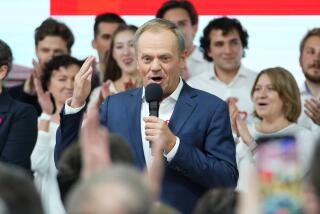Warsaw Tries to Define New Role for Solidarity
- Share via
WARSAW — The Politburo of Poland’s Communist Party met behind closed doors Wednesday night, apparently in an effort to hammer out the exact wording of a proposal that could lead to legalization of Solidarity, the outlawed trade union.
Early in the day, after 17 hours of arguing, the party’s Central Committee had concluded a stormy two-day session by voting to endorse a position on political and trade union pluralism. So fierce was resistance from conservative members of the committee to the legalization proposal that at one point, party First Secretary Wojciech Jaruzelski, Premier Mieczyslaw Rakowski, Defense Minister Florian Siwicki and Interior Minister Czeslaw Kiszczak all offered to resign, the official news agency PAP reported.
However, the Central Committee gave Jaruzelski, who is also head of state, and his three colleagues an overwhelming vote of confidence at the meeting, PAP reported.
The later vote approving the resolution that could lead to legalizing Solidarity was less sweeping, the news agency indicated.
Stringent Conditions
No details on the party’s stand were announced, leaving opposition activists in Solidarity to speculate over whether a set of stringent conditions laid down by Premier Rakowski had been included.
Rakowski, in a speech pushing the party’s conservative forces to go along with the party leadership’s attempt to reach an accommodation with Solidarity, said the union would have to agree to a two-year moratorium on strikes, declare itself “an integral part of the socialist system” and renounce financial aid from Western supporters, including the U.S. Congress.
The party’s leading ideologist, Marian Orzechowski, said in a television interview Wednesday that the party’s official proposal, which he said would be made public Friday, was “a great turning point” leading to Solidarity’s legalization. He said the party document mentions the union by name but does not spell out the conditions.
“It opens the road to restoration of trade union pluralism, including Solidarity,” Orzechowski said. A number of conditions were included but “the road is not too bumpy,” he said.
“We don’t know the reaction of the other side yet,” he said, “but I think the most important thing has been said. The ‘magic word’ was used in the document. . . . The basic barrier which has been blocking all practical steps has been overcome.”
A Solidarity spokesman, speaking on condition of anonymity, at first called the conditions outlined in Rakowski’s proposal “laughable.” He argued that the union would have to surrender its carefully protected independence in order to agree to Rakowski’s terms.
But other activists said they believe that the party’s action could lead to a resumption of the long-stalled “round-table talks” between Solidarity and the government.
The talks were proposed last August, in the midst of last year’s second round of labor unrest, but were broken off by Solidarity leader Lech Walesa, who demanded that the government clarify its intention to legalize the union before any further meetings.
Could Be Opening Bid
“I think this meets Walesa’s demand that the authorities state a clear intention,” said Jan Litynski, a Warsaw Solidarity activist. “I think Rakowski’s conditions were empty words, intended to sooth the party.”
Political analysts said the list of demands by Rakowski could turn out to be the government’s opening bargaining position with Walesa. They said that progress toward resuming the talks and eventual legalization of the union was likely to be fitful and drawn out.
Both sides in the lengthy bargaining between the union and the state have approached the process like wary poker players, with both displaying a keen appreciation of the skill across the table.
For both sides, the stakes are high. The party and the government, presiding over a rapidly declining economy with ever-diminishing credibility, is gambling that negotiations with Solidarity will buy enough time to allow it to push forward with painful reforms.
Solidarity, as its leaders contemplate an accommodation with the government, risks losing its independent voice if it draws too close to the authorities and finds itself lured into the role of loyal opposition, thus sharing responsibility for the government’s performance.
In addition, Solidarity has internal divisions, between “moderate” and “radical” forces, that fractured the union in its early days.
Although the bargaining between the government and the union is likely to be arduous, the Communist Party’s action suggested that an important shift is under way within the party.
Although party members representing factories and rural agricultural enterprises voiced opposition to Solidarity in the Central Committee meeting, many expressed deep disillusionment over the party’s failure to deal with the long political and economic crisis.
Boguslaw Kalabarczyk, a Central Committee member from a plastic works in the town of Pionki, complained that “futile anger” exists among workers over the ineffective work of local officials.
More to Read
Sign up for Essential California
The most important California stories and recommendations in your inbox every morning.
You may occasionally receive promotional content from the Los Angeles Times.











